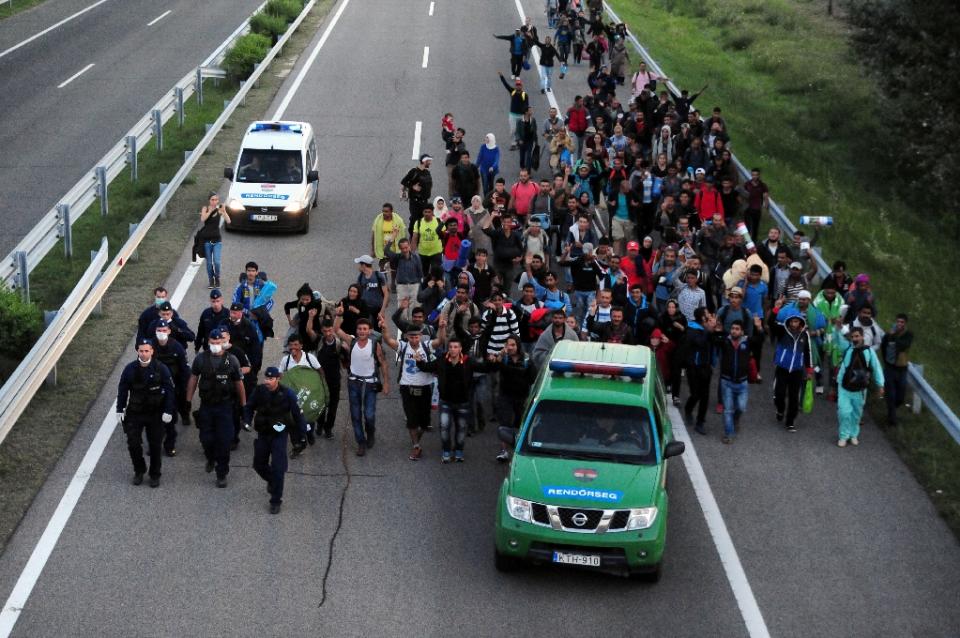Refugees As a Consequence of Conflict
"Faced with the tragedy of tens of thousands of refugees who are fleeing death by war and by hunger, and who are on a path toward a hope for life, the Gospel calls us to be neighbours to the smallest and most abandoned, to give them concrete hope."
Pope Francis, St. Peter's Square, Vatican City
 |
| Migrants walk along the M5 highway in Hungary heading for Budapest, after breaking out from a collection point near Roszke on September 7, 2015 (AFP Photo/Csaba Segesvari) |
And so no less an authority on godliness and peace than Pope Francis has stepped into the controversy over the flood of Syrian (and Afghan, and Iraqi and Eritrean) refugees that have swamped the capacity of Europe to welcome them with open arms, food, medical assistance, and lodging, proclaiming their Christian duty to give haven to prevail. From other, less-publicized sources come news of Christians in Africa being slaughtered by Boko Haram, but no word from the Pope on their plight as yet, prevailing upon Islamic piety and peacefulness to protect Christian life.
The European Union in the midst of the crisis of hundreds of thousands of migrants crowding into Greece and other entrance European states, is drawing plans for redistribution of the asylum seekers across its 28 member-states. The EU would pledge to give governments $9,000 to cover the needs of each refugee they agree to accept. Famously, German Chancellor Angela Merkel insists refugee resettlement would be "one of the grand projects of the European Union in the years ahead", a kind of cultural mass suicide.
As things stand at present, Europe can hardly recognize itself. It is in the irreversible process of complete transformation, and the drive toward achieving it has become relentless. Muslims fleeing Muslim carnage have no wish to remain where Islam has become fraught with pathological hatred and violence aimed at its faithful, preferring to migrate where their lives will be seen as valuable and they will be given the opportunity to prosper.
Mind, Hungary's Prime Minister Viktor Orban is less than thrilled with the plan: "Has anyone thought this through?" he demanded, rhetorically. The U.K., Ireland and Denmark have opted out of the EU immigration policy as a matter of autonomous principle; the refugee redistribution plans do not impact them. Denmark is doing its bit to inform its position on the matter by posting Arabic-language advertisements to warn Syrian refugees they needn't bother heading to Denmark.
Iceland has agreed to accept 50 refugees over two years. Israel has explained that as a "small country, a very small country that lacks demographic and geographic depth", it is unable to accommodate the demands that Syrian refugees be absorbed wherever possible, and even if not possible. New Zealand announced plans to absorb 750 refugees over three years, up from the original 150. The United States has accepted 1,554 Syrian refugees since 2011; some consideration may be given to accepting more by the end of 2018.
France is prepared to take in 24,000 asylum seekers over a two-year period, while Germany has generously set aside over $7-billion to deal with an anticipated 800,000 migrants set to enter its borders from Syria, Iraq and Eritrea. Greece flails helplessly to contain the 230,000 refugees that have arrived on its eastern islands, requesting emergency European Union help to deal with the influx of people expecting to be accommodated.
The Greek island of Lesbos has seen violence between police, locals and groups of Syrians, Iraqis and Afghans. The island of 85,000 people has been flooded by the presence of migrants complaining that local authorities deserve a failing grade on processing them quickly enough, leaving thousands stranded on the island, rather than permitting them to continue on to western Europe. And in Hungary hundreds of migrants once again ignored rows of police to surge onto a highway to head north to "Germany! Germany!"
None of the richest states in the Middle East -- Saudi Arabia, Qatar, Bahrain, Kuwait, Oman and the United Arab Emirates have bothered with bringing in Syrian refugees. Their collective donation toward aiding the refugees amounts to one-seventh of what the United States has committed to. On the other hand, an Egyptian billionaire has offered to buy an island on Italy or Greece to fill it with Syrian refugees. "All I am asking is find me an island, I will make the financial payment for it."
Naguib Sawiris plans, he said, to spend between $10- and $100-million on acquiring such an island. No word on what it would cost to build suitable housing, municipal infrastructure, medical facilities, and schools to minister to the needs of the new island population, let alone how he plans to offer employment to the hordes he means to settle, nor alternately provide them with an ongoing income so they won't all starve.
Labels: Afghanistan, Africa, Europe, Iraq, Migrants, Refugees, Syria

<< Home